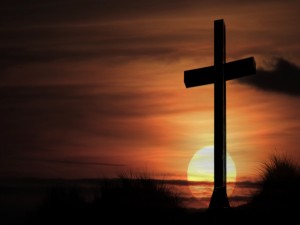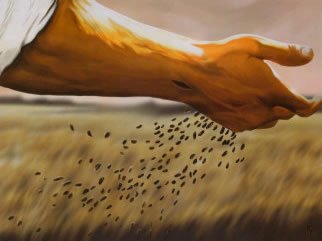About 1400 years ago, the Roman Catholic Church and the Byzantine (Greek Orthodox) Church unofficially adopted a fun celebration the day before All Saints’ Feast Day. The day became known as All Hallow’s Eve or Halloween.
 The purpose of this time was to mock evil. Dressing up like skeletons and wearing death masks, people–young and old–paraded through the streets and celebrated our freedom from evil through the sacrifice of Jesus.
The purpose of this time was to mock evil. Dressing up like skeletons and wearing death masks, people–young and old–paraded through the streets and celebrated our freedom from evil through the sacrifice of Jesus.
After studying the subject, it appears that this All Hallow’s Eve commemoration sprang up as an informal celebration. Later, known as Halloween, the day formed from a joyful expression rising from the villagers and common folk who wanted to express in a playful and joy-filled way their release from sin and fear.
Other than Resurrection Day, All Saints’ Day is the most holy day within the Liturgical Calendar. It started within the eastern (Byzantine) and western (Roman Catholic) churches, sometime in the early 600’s.
 The foundation of the celebration came from the tremendous persecution Christians experienced in the early days of the church. Torture and death under the Roman Empire had run rampant for the early believers. Rome’s emperors needed a scape goat to explain the decline of the empire. Torturing Christians became a reflective entertainment for the masses. It was a distraction from the woes the Roman citizens were experiencing. As a result, All Saints Day was a holy day of honoring these martyrs. Christians still living expressed their love and gratitude for the sacrifices and deaths of the early Christians.
The foundation of the celebration came from the tremendous persecution Christians experienced in the early days of the church. Torture and death under the Roman Empire had run rampant for the early believers. Rome’s emperors needed a scape goat to explain the decline of the empire. Torturing Christians became a reflective entertainment for the masses. It was a distraction from the woes the Roman citizens were experiencing. As a result, All Saints Day was a holy day of honoring these martyrs. Christians still living expressed their love and gratitude for the sacrifices and deaths of the early Christians.
The scriptural bases was the New Testament teaching that those Christians who have died pray for us who are still alive, interceding before the Father. This is not a day to worship the saints but to venerate and acknowledge their past, present and future contributions to the growth of all Christians, by remembering their prayers and faithfulness. At first it was time of feasting to remember the martyrs. Later, the expressions of joy were extended to all saints, living and dead. Within the Roman Catholic Church, this celebration is focused on men and women who have been canonized as saints. Most Protestants dropped the celebration of All Saints Day, even though they have clung to the celebration of Halloween.
 In the 600’s, the day before All Saints Day (Halloween) became a time to remember the poor. Dressed in their evil-mocking costumes and masks, the poor would visit the homes of their more prosperous neighbors. The poor would be given sweet buns to carry back to their families. It appears that the custom grew from the fact that the more prosperous neighbors wanted to be sure that the entire community would have enough provision to celebrate All Saints’ Day. This wasn’t a custom glorifying begging but of blessing others with gifts. The giving of sweets was an expression of love by the Church, desiring that all people would share in God’s gracious provision on this holy day. As the custom grew, it playfully became known as trick-or-treat.
In the 600’s, the day before All Saints Day (Halloween) became a time to remember the poor. Dressed in their evil-mocking costumes and masks, the poor would visit the homes of their more prosperous neighbors. The poor would be given sweet buns to carry back to their families. It appears that the custom grew from the fact that the more prosperous neighbors wanted to be sure that the entire community would have enough provision to celebrate All Saints’ Day. This wasn’t a custom glorifying begging but of blessing others with gifts. The giving of sweets was an expression of love by the Church, desiring that all people would share in God’s gracious provision on this holy day. As the custom grew, it playfully became known as trick-or-treat.
Slowly, over the 1500 years that have elapsed, the customs of dressing up and receiving sweet treats from neighbors has stuck. Sadly, the original meaning of the celebration has been long forgotten, even by Christians. In fact, within Protestant traditions, the day is more and more rejected as witchcraft, wicca and other evil religious orders have adopted the day as a time of glorification of evil, rather than mocking.
Too often within the traditions of the Church, mocking evil becomes glorification. Christian feast days–like Christmas and Resurrection Day–become an excuse for drunkenness and gluttony. Perhaps Halloween–the day before a time of most holy remembrance–should not be ignored by Christian. Perhaps it should become a wake-up call. While we are redeemed by the precious blood of Christ, our Adamic nature lurks concealed by religious zeal ready to pounce and pervert even those things which are most holy in our lives.
When does mocking evil become glorification? It isn’t merely the day of Halloween that I struggle. I wrestle with it every day. Maybe we need to learn to respect and avoid the enemy of our souls. The Bible tells us to flee from evil rather than try to overcome evil in our own strength. Jesus’ death releases us from the fear of death and hell; it doesn’t give us license to flirt with sin.
In the meantime, I want to bless the children in my neighborhood with sweet treats. I will pray for them, asking God that they too will become part of the mystical body of Christ, which is the Church.

